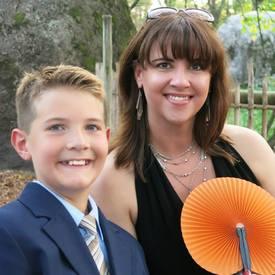Celebrating Mediocrity in Children

Turtlehurdle
Posts: 412 Member
Do you praise and celebrate your child even if he/she did a bad/mediocre job on a task or in sports? Example: giving children trophies even though they were in last place?
Do you agree with celebrating medriocrity?
Does your household celebrate mediocrity? If so, why?
Do you agree with celebrating medriocrity?
Does your household celebrate mediocrity? If so, why?
0
Replies
-
Do you praise and celebrate your child even if he/she did a bad/mediocre job on a task or in sports? Example: giving children trophies even though they were in last place?
Do you agree with celebrating medriocrity?
Does your household celebrate mediocrity? If so, why?
As soon as we are mediocre I'll let you know.0 -
As far as giving everyone trophies... No. I don't agree with that. Part of raising a child is preparing them for the real world, not making them as comfortable as possible.
That being said, I reinforce pride in my son even when he does something mediocre, then again he's 5. I feel at this stage, telling him either "I'm proud" or "I'm displeased" after doing even little things, build his knowledge of what's right/wrong or whats appropriate/inappropriate. I'll have expectations of him when he gets older as far as basic things go.
Too many people keep their children in a plastic bubble of comfort. Kids have little or too much freedom, high expectaions and a sense of entitlement when you celebrate mediocrity.0 -
We celebrate success at the level it deserves. If one of the kids accomplishes something that is difficult for their skill level, or is something totally new to them, even if it isn't perfection by someone else's standards, yes, it is still acknowledged. If they half *kitten* something but it is at a level that someone outside may say is an incredible feat, no, that isn't celebrated, we talk about what they were capable of doing but didn't. So, depending on the situation, in someone else's eyes, yes and no.0
-
I don't think giving a chilid a trophy for last place--or a ribbon of participation, whatever we want to call it--necessarily qualifies as celebrating mediocrity for everyone.
It kind of depends on what we think the goal is. If someone feels like participation is at least of equal importance to winning, then giving trophies (as a form of praise) to all levels, seems appropriate. We can still distinguish those who achieve higher results than the others. If we want to take a survival of the fittest approach to activities, then I suppose it counts as celebrating mediocrity.
Just from my personal experience, I didn't really appreciate the constant "strive for your best" crap. "Why did you get a B+, you can get an A." I got a B+ b/c I know I can get an A, I have mastery of the material, and I didn't give a damn about an arbitrary set of standards. So it's not so much that I think I want mediocrity celebrated, it's that I disagreed with the point of putting in the effort to get an A--still do. I'll pick my own rat maze to go through with rules I approve of, thank you very much.
Competition isn't a justifiable end in itself. The experience should be praised. Some people consider that celebrating mediocrity, but I don't.0 -
Well... yes, I think I do. But my son is five. When he was done with a baseball game, I always told him he did a great job and pointed out something good he did... Like TRY to catch the ball even if he didn't succeed. He's 5... It's overhand pitch, catching a fly ball is unlikely for any of the kids on his team. More than anything I would applaud him for never whining or pouting if he struck out, got hurt, etc.
The kids on his team never even knew or asked the score b/c they're still too little to care. They got ice cream at the end of the season not trophies.
But in a couple of years I imagine that will all change. As to truly giving trophies to a losing team, I don't understand that. Part of growth is understanding disappointment and failure and learning how to responsibly cope with those feelings.0 -
My son, David, has autism and he has taught me so much about celebrating the little things! But, he's obviously different. I don't want my kids getting a trophy for coming in last place. I don't want them getting a "participation award" just for showing up to school everyday. But, I'm also not the mom who demands straight A's or the MVP every game. I have 5 kids, so I can tell you there are times when I've cheered (literally) for a D- on a report card!0
-
You can enourage your children and compliment them without "celebrating mediocrity"
If my kid loses the game, but keeps his composure, I can still say, "you showed good sportsmanship, because some kids cry and whine when they lose. I was proud when I saw you didn't do that"
You can be uplifting to your child without being fake. I think we all dislike the fake praise, and kids do, too. They can spot an insincere "wtg" a mile away.0 -
Celebrating mediocrity isn't a big deal, children are going to be competitive anyway. I have coached my son's flag football team. Flag is for 6 and 7 year old kids and no score is kept. But the kids always keep track of whether they won or lost. They know the score after every game and how many games they've won that season, even when I forget.0
-
Celebrating mediocrity isn't a big deal, children are going to be competitive anyway. I have coached my son's flag football team. Flag is for 6 and 7 year old kids and no score is kept. But the kids always keep track of whether they won or lost. They know the score after every game and how many games they've won that season, even when I forget.
Where the HELL have you been???0 -
As far as parental responsibility goes, I believe in encouraging kids to do their best. But that has to be accompanied by an effort to teach them that their best is not always going to be good enough to win. Kids need to learn the concept of failure and develop a strong dislike for it. Otherwise, nobody would ever try to "win" (i.e. be successful) at anything, and societ would crumble around us.0
-
Celebrating mediocrity isn't a big deal, children are going to be competitive anyway. I have coached my son's flag football team. Flag is for 6 and 7 year old kids and no score is kept. But the kids always keep track of whether they won or lost. They know the score after every game and how many games they've won that season, even when I forget.
Nice to have him back right?Where the HELL have you been???
I dunno. My daughter has yet to get involved in any sports ot activities where this is an issue. She's not even 4. But at home I celebrate her accomplishments. All of them. "That is a MEGA poop, baby!"
I think I'll fall on the side of rewarding accomplishment/winning. I started swimming competetively at age 5 and it was great. Even when I lost. And I lost a lot.
But then I won't really know until my daughter is crying her eyes out because she didn't get a trophy. Then I'll probably bum rush the li'l ***** who did's parents and take their ****.0 -
Exactly. Katy would rather get no award then a made up one. In kinder, she got the "Best Smile" award. She said, "I guess they made THAT one up". Ha!They can spot an insincere "wtg" a mile away.0 -
Where the HELL have you been???
I started eating carbs a few weeks ago, it all kinda went downhill from there.
I've done some things in exchange for sugar packets that I'm not proud of. Hopefully others can learn from my experiences and not make the same mistakes I did.0 -
Where the HELL have you been???
I started eating carbs a few weeks ago, it all kinda went downhill from there.
I've done some things in exchange for sugar packets that I'm not proud of. Hopefully others can learn from my experiences and not make the same mistakes I did.
Is there video??
Nice to have you back ;-)0 -
Where the HELL have you been???
I started eating carbs a few weeks ago, it all kinda went downhill from there.
I've done some things in exchange for sugar packets that I'm not proud of. Hopefully others can learn from my experiences and not make the same mistakes I did.
freebasing splenda in a dimly lit corner listening to John Tesh. I can see it.0 -
Nope. There's no reason to berate the child for not performing well, either, though. As a teacher, I'm really conscientious about what I say to kids when they do well AND when they still have work to do. Praising a job not well done doesn't send them the correct signals. It's quite obvious to all of the other students who are "getting it" that you just lied to the student in order to make them feel better, which does them no favors socially or academically. You have to encourage them to try again, but most definitely acknowledge any progress that has been made, no matter how small. Take care with their egos, make sure they know you have their back, but address what needs improvement.0
-
I agree on praising children who are 3, 4, 5, 6, even 7 but 8 and older? No.
I would think that at the age of 12 or 13 awarding/praising would just be teaching them to be conformists? I mean, they are being praised for coming in at last place?0 -
I agree on praising children who are 3, 4, 5, 6, even 7 but 8 and older? No.
I would think that at the age of 12 or 13 awarding/praising would just be teaching them to be conformists? I mean, they are being praised for coming in at last place?
I don't see how conformity fits into it. Praising children for participation doesn't preclude distinguishing exceptional performance, though that seems to be an underlying assumption if I'm reading some of the responses correctly.0 -
This is a very interesting and worthwhile topic, Turtlehurtle. Congratulations on starting it. I'm proud of you!0
-
This is a very interesting and worthwhile topic, Turtlehurtle. Congratulations on starting it. I'm proud of you!
Aaaaaaaaand...SCENE!0 -
This is a very interesting and worthwhile topic, Turtlehurtle. Congratulations on starting it. I'm proud of you!
I will enjoy the debate, no matter the outcome.0 -
No. Even my 5 year old knows better. He knows when he loses and it never feels good. Even if I tell him he did his best, he pouts back that his best didn't win. I like the fact that he hates losing, so I don't celebrate it or make it go away with a trophy or prize. I'm enjoying this test of fatherhood. My 7 year old, more competitive. I'm trying to teach this one not to brag so much. Awesome time.0
-
If we are talking about recreational sports for children, I am all for encouraging them. Not focussing so much on the competitive aspect, but more on the social aspects.
There's time enough to teach them about winning and losing as they get older.
I taught my children to give it their best shot and be proud when they did. Winning does not always have to be the goal.
I still play in a competitive indoor soccer league. Doing my best and still losing makes me feel better than winning when I didn't play well.
Over the years and countless softball, soccer, basketball and volleyball games that I have ferried kids to, I have found that the worst thing about children's sports are the parents.0 -
The way things are now, at least 80% of the population will have ample opportunity to learn what it feels like to get screwed over in life. I'm not going to begrudge some 8 year old a f*cking participation award.
As others have said, most kids are smart enough to make the distinction themselves. It's a self-delusion to think we are teaching them anything about this subject.0 -
My daughter's gifted in lots of areas - consequently, she's actually quite poor at sticking with the things that she's less brilliant at.
I don't think encouraging her to stick with these things is 'celebrating mediocrity'. It's encouraging her to engage in hard work, and to enjoy doing the best she can.
Some children will never excel at anything, they're always going to be middle of the road. There's a reason that average is average, after all! it's a good lesson to learn that there's pleasure in being ok at something. Nothing wrong with that0 -
I think there's a big difference between the 'prizes for all' mentality that is currently pervasive, and genuinely encouraging and praising individual achievement, even if it is at a less-than-stellar level. I believe it's very important to praise children (and adults!) who have tried their hardest, worked their behinds off, or struggled to overcome difficulties when they achieve their goal, even if that goal seems mediocre from an outside perspective. That doesn't necessarily mean rewarding them in the same way as the person who ran the fastest, figured out nuclear fission or won the competition, but acknowledging the achievement is fairly essential to building confidence and a willingness to keep trying.
Beyond the age of 6 or 7, the idea that "all must have prizes" does an immense disservice to kids and the community as a whole in the future, as well as underestimating, as others have said, kids' b.s. meter. Of course children know that someone won and someone else didn't. To pretend otherwise is an insult to their intelligence and to their efforts. Learning to handle that emotionally, and picking yourself up to start again and change your approach or try harder next time is a fundamental part of growing up.
By the way, meerkat - keep on encouraging your daughter to persevere with the things that don't come easily, and praise her when she achieves things that are more difficult for her. I was/still am less good at sticking with things that weren't 'natural' to me, and there are a good handful of things I rather wish I had stuck with! I sometimes think it's even more frustrating for the very bright when something doesn't immediately 'click' than it is for the less-intellectually-gifted, because the very bright are used to effortless comprehension. Learning to work for something can be quite hard when many things require little or no effort - I speak from experience, and wish I had learned sooner.
Back to our debate topic, learning to work for something can be hard, or seem pointless, when all are rewarded for simply participating. No-one wants (or needs) a room full of sobbing 3,4 or 5 year olds who have 'lost', but I don't think it's productive for a room full of 8, 10, 14 year olds to hear that all of them have 'won', when they know perfectly well that they haven't.0 -
In the 90s I got a trophy for every team I played in till the age of 11. I threw them all out but still have the trophies that I earned.
I coach age groups of under 10. I can find a positive for all these kids. I've got one kid that is slow as heck. To the point I have to tell him to remember to run really fast or he'll literally saddle to first base. Bt I'll celebrate his achievements when he gets there. By the end of the season I didn't need to tell him.
Or the boy who hit the ball, ran to the ball and picked it up, threw it to first and still got safe. Should I have told him he was doing it wrong? (well it was hard because all the parents, coaches and umpires were laughing too hard to do anything)0 -
I try really hard to base my praise off the 'effort' v the 'results'. If I know that hard work was put into something I will applaud it, point out what did work so we can talk about what didn't work and what could be better next time. Sometimes it is exhausting because you actually have to pay attention! If a kid just gets lucky then I call it 'lucky', not a 'good job.'
You know what I HATE? When people randomly write WTG in the comment of my food journal. I can come in with some crazy numbers at the end of the day and some *kitten* will say WTG for no reason.0 -
The way things are now, at least 80% of the population will have ample opportunity to learn what it feels like to get screwed over in life. I'm not going to begrudge some 8 year old a f*cking participation award.
As others have said, most kids are smart enough to make the distinction themselves. It's a self-delusion to think we are teaching them anything about this subject.
I kindof agree. I think my son was born competitive. He has wanted to 'win' at everything he does since he was 2 years old. I am the least competitive person on earth, sooo.
Is it possible though that participation awards are robbing the kids of an opportunity to learn coping skills while the stakes are low? I think yes.0 -
The way things are now, at least 80% of the population will have ample opportunity to learn what it feels like to get screwed over in life. I'm not going to begrudge some 8 year old a f*cking participation award.
As others have said, most kids are smart enough to make the distinction themselves. It's a self-delusion to think we are teaching them anything about this subject.
I kindof agree. I think my son was born competitive. He has wanted to 'win' at everything he does since he was 2 years old. I am the least competitive person on earth, sooo.
Is it possible though that participation awards are robbing the kids of an opportunity to learn coping skills while the stakes are low? I think yes.
I don't mind participation awards, on principle, as long as that's what they are, and that is made clear. It's when that mutates into the 'there are no winners and losers/everyone 'won'" approach that I think it becomes more a hidrance than a help after a certain age.0
This discussion has been closed.
















